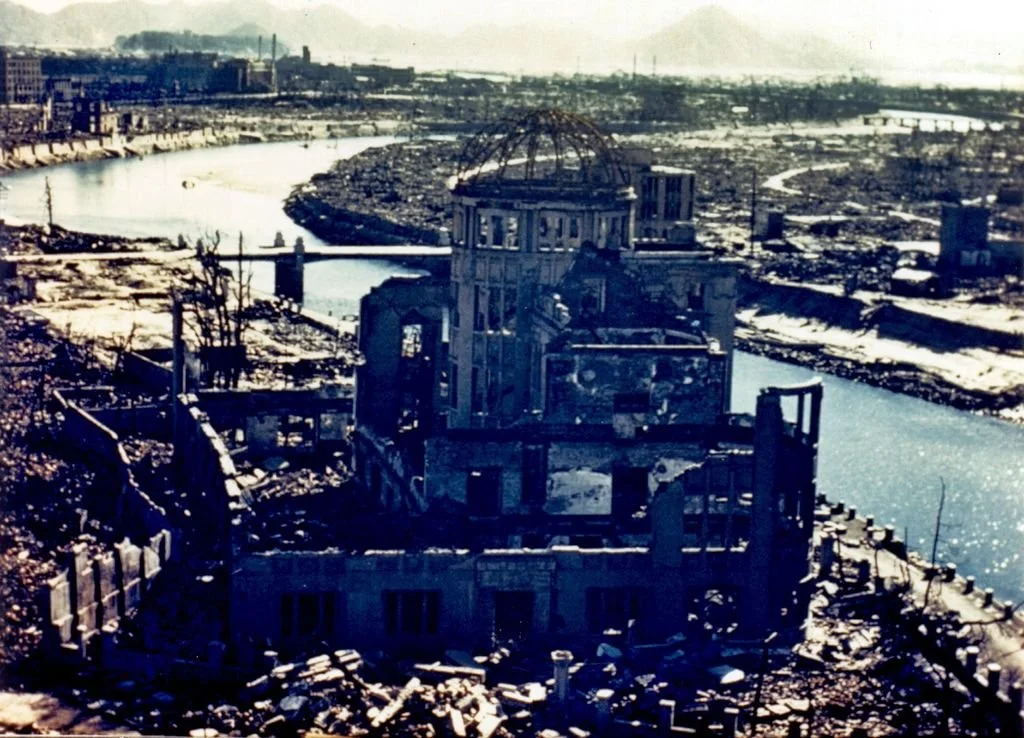Wallowing in evil: ‘The Hiroshima Men’
Tamsin Geach OP• August 6, 2025
“Big bomb dropped on Hiroshima B August 5 at 7.15 pm Washington time. First reports indicate complete success." Eighty years ago, this laconic message announced to President Harry S Truman and the American people one of the atrocities of the 20th century.
Yet in the years before the war, Truman's predecessor, Franklin D Roosevelt, had appealed to the governments opposing Hitler "publicly to affirm [the] determination ... in no event and under no circumstances[to] undertake bombardment from the air of civilian populations".
In his book The Hiroshima Men, Iain MacGregor, hampered in his efforts by poor proofreading, traces the seemingly inevitable course of events, the planning and execution of the development of the bomb and the trajectory of several key players: President Truman; General Leslie Groves, who led the Manhattan Project with Oppenheimer; USAF pilot Colonel Paul Tibbets, who flew the plane that dropped the bomb; and the plane itself, the B29, which (unusually) is a character in the book.
These were men who loved their country, and, if they had them, their children and their wives. They even had a penchant for chocolate. And they caused the death of more than 120,000 people.
How does someone reach the point of being willing to do unspeakable evil? We are used to asking that question about the Nazis, less often about those who planned through years to unleash the horror of the nuclear bomb on Hiroshima and Nagasaki, and who knew that the long-term consequences would be terrible, if not predicted in all their details.
They knew the air would catch fire, perhaps; but not that mothers would clutch "charcoal babies". Did they know that radiation sickness would engulf the inhabitants who survived and those who went on rescue missions? That the hibakusha (bomb-affected people) would pass on to their children, as well as the trauma, a genetic predisposition to cancer?
In The Hiroshima Men this story unfolds in (sometimes literally) gut-wrenchingly horrible detail, interweaving the accounts following the Americans with the ordinariness that was incinerated among the Japanese children on their way from school, the mayor anxious to get his offspring out of Tokyo after it had been firebombed because "the enemy will return. That is the nature of war."
In a story that really does refer to humanising details like love for chocolate, we are led through the course of events. Whereby for the Americans, the combination of confronting in the Japanese a ferocious and pitiless enemy who had left behind a trail of murder, rape and other brutal mistreatment of defeated peoples, as well as an intransigent and remorseless resistance in the face of defeat (killing themselves when the end was near, and forcing civilian populations under their rule to do likewise), along with a long "othering" of the Japanese, thereby made the action seem not only possible, but the only thing possible.
After which the USA moved from Roosevelt's righteous plea to dropping atom bombs on Hiroshima and Nagasaki.
Who wants to waste a good bomb? The American fire-bombing raids in Japan had spared Hiroshima. Why? Because the producers of the bomb wanted a "virgin"city to ravage. This action may have shortened the war – may even have reduced the number of war dead – but it was in effect a large-scale experiment.
The true horror of this story, to my mind, is this: the Japanese had sued for peace. The war was in effect over, bar the unjust demand for "unconditional surrender". The Americans could claim that the Japanese were given this possibility.
Nevertheless, as the British philosopher and Catholic convert GEM Anscombe put it, "the consciousness of the possession of such instruments had its effect on the manner in which the Japanese were offered their chance".
Truman was awarded an honorary degree from Oxford in 1956. Anscombe, who was my mother, famously opposed it: "In the bombing of these cities it was certainly decided to kill the innocent as a means to an end. And a very large number of them, all at once, without the interstices of escape or the chance to take shelter."
Is it fitting to read such a book, in effect wallowing in intense evil? Possibly ten years ago such a question was possible but in our current political climate books like The Hiroshima Men are needful, in order to remind ourselves, channelling George Santayana, of what is at stake:"Those who cannot remember the past are condemned to repeat it."
Photo: Hiroshima, 1945: the remains of the Hiroshima Prefectural Industry Promotion Building.
Sr Tamsin Geach teaches Latin at Blackfriars, Oxford
The Hiroshima Men by Iain MacGregor, Little Brown, £25, 448 pages

